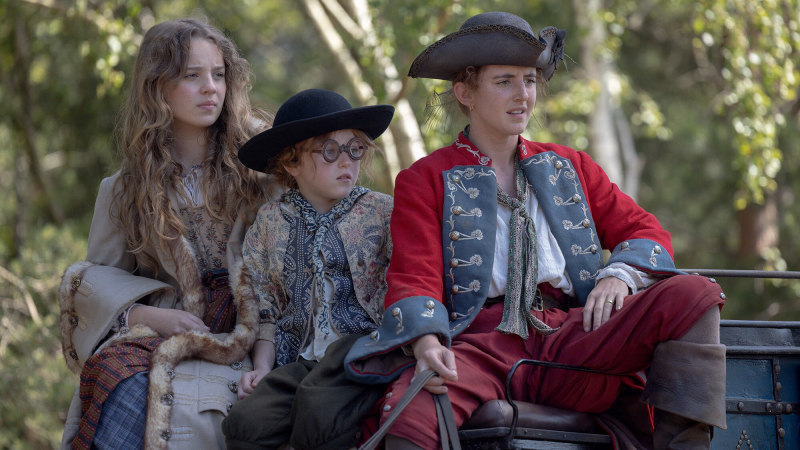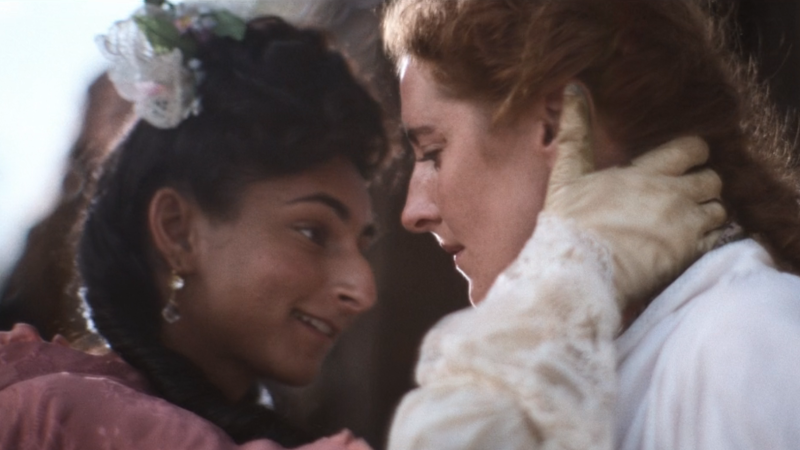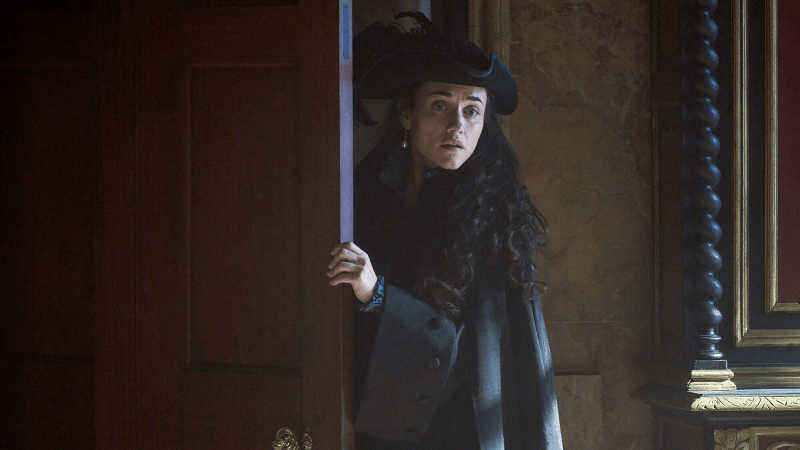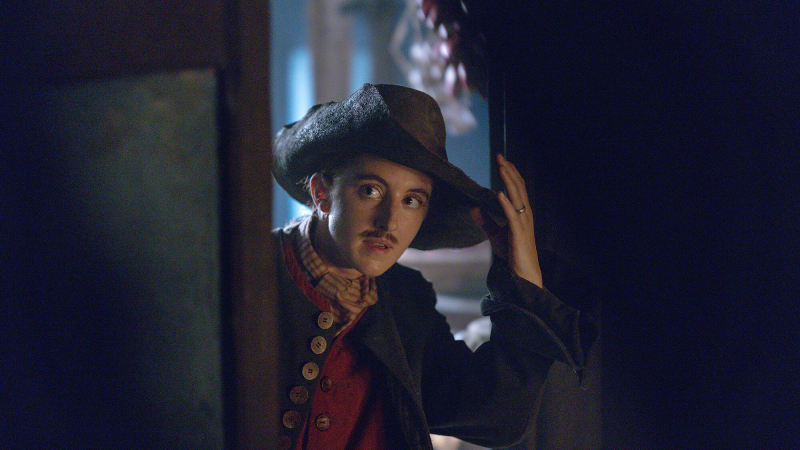Nell Jackson didn’t set out to become a highwaywoman; in fact, all she wanted to do was be a good soldier. Recently widowed, she returned to her hometown, where everyone thought she died with her husband. And when she returns, she returns a little…different. On her way into town, she’s held up by a highwayman, and a little mote of light goes into her mouth and imbues her with supernatural strength and speed and she’s able to get out of the jam all on her own. (Also this is neither here nor there, but there is currently another show about highwaymen called The Completely Made-Up Adventures of Dick Turpin that also features a highwaywoman named Nell, but apparently this is a complete coincidence, because while Dick Turpin was a real person, neither the Nell in that show nor Nell Jackson are.)
Played by Derry Girl Louisa Harland, Nell Jackson is a fierce, funny, sarcastic woman with no interest in behaving the way people of her time think women should behave. Nell prefers wearing pants to skirts, and doesn’t care if you mistake her for a man, as long as you don’t call her Nellie. But while she is clearly gender non-conforming for her time, there’s no evidence of her being queer. She seems to have loved her late husband, and doesn’t show romantic interest in anyone else. Which is only a bummer in that it means we don’t get to know whether or not she’s queer; in the grand scheme of things, I really appreciate a woman’s story not having anything to do with romance at all. Nell has more important things to worry about. Over the course of the season, Nell finds herself in many sticky situations, and is on a mission to clear her name of a crime she didn’t commit, all while protecting her two little sisters, Roxy and George.

Don’t underestimate them. Photo by Robert Viglasky.
There is a queer character we meet, though I’m not sure if she’s even fully aware of her own queerness by the end of the season. While on the road, Nell resorts to a little highway robbery, stopping the carriage of a wealthy family, stealing only what they need and letting the family go. The daughter of this family, Polly Honeycombe, becomes instantly enamored with this “highwayman” and eventually meets back up with Nell and her crew. While she is definitely surprised when it was revealed to her that Nell is a woman, it didn’t stop her from fantasizing about Nell. At one point, she even kisses Nell square on the mouth…to which Nell has no reaction. It’s then never addressed or brought up again. Very confusing. So while Polly does indeed seem to be queer, the mere fact of gender not getting in the way of her crush, it’s unclear if it goes deeper than her fascination with Nell.

I did appreciate Polly’s fantasy giving Nell the 90s slow-mo heartthrob treatment.
And personally, my queer heart was pulled in a slightly different direction. One person dedicated to stopping Nell is Sofia Wilmot, the magistrate’s daughter. Sofia is trying to keep her younger brother out of trouble, because she is unable to inherit the power and estate her father would leave behind. And let me tell you, Sofia Wilmot is the most Katie McGrath-coded character I’ve ever seen not played by Katie McGrath. I swear if this show was made ten years ago, it would have been her playing it. The character has a dash of Morgana’s arc and a touch of Lena Luthor’s serious stillness. Sofia starts out very buttoned up, prim and proper, rarely speaking, just listening, observing. But by the end of the season, she has let her hair down and taken power by the reins.

Tell me the casting call didn’t say “Katie McGrath type.” Photo by Robert Viglasky.
Sofia and Nell are posed as enemies, but they have more in common than either of them realize: They’re both widowed, both protective over their siblings, both feeling limited by what they can do as a woman in 18th century England, both consistently underestimated, and both more powerful than they even realize.
Sofia Wilmot is also played by queer actress Alice Kremelberg, who points out that even though the queer representation on this show is minimal, it is “very exciting, especially for a show that is on Disney and is for everyone.” I just wish they had pushed it a little further, either having Polly have a line about being surprised she still has a crush on Nell even though she knows she’s a woman, or even saying “I don’t care that Nell’s a woman, I still want her to sweep me off my feet” or something. Or maybe even, once the strange kiss moment passed, eventually having Polly eying another woman with similar vibes to Nell’s, indicating her horizons are a bit more open now. It was played off as a joke, which was fine and cute, and I’m glad nobody tried to dissuade her from her crush, and instead just let her know that Nell is a woman, but I still wished they hadn’t played it so…safe. When the backlash came out about the kids’ show Bluey momentarily almost hinting at the theoretical existence of a dog with two moms, I saw someone say something along the lines of: Bigots are going to get mad no matter how big or small your queer representation is, so why not commit to it if you’re going to include it at all? Similarly, PinkNews and Wikipedia both credit trans actress Iz Hesketh, who plays a noble assistant Valerian, as playing a non-binary character, Wikipedia even going so far as to say, “She is the first person to portray a non-binary character to appear in a Disney live action series.” But I would argue this is not an obvious fact. It’s very possible they/them pronouns are used by Valerian in the show, but if they are, I missed it entirely. (Side note: Iz uses she/her pronouns now but identified as non-binary at the time of filming.) Maybe I’m being too cyclical, but it feels like another instance of the representation being almost there. I wanted them to push the envelope juuuust a little further.
I find all of this especially surprising given the creator of this show, Sally Wainwright, was also the creator of Gentleman Jack. So maybe her hands were tied by Disney, maybe there was just too much other story to tell, who’s to say. Hopefully if the show gets a second season, we’ll see more obvious representation.

Nell is a drag king and we stan. Photo by Robert Viglasky.
Overall, this was a fun fantasy romp with a lot of heart. While there were still men pulling some reigns — for example, both Nell and Sofia technically get their power from a man, at least at first; Nell from the sprite Billy Blind that has been assigned to her for reasons neither of them know at first, and Sofia from the Earl of Poynton — at its core, this show is about young women. It’s about Nell and Sofia; it’s also about Roxy who wants to be able to choose who she loves and maybe has a touch of magic in her herself; it’s about George, as fearless as she is small, the first in her family to learn how to read. Also, Joely Richardson’s Lady Eularia Moggerhanger, who runs the local newspaper and is always looking for gossip, is a hilarious and fun character.
So, while I wouldn’t recommend this show based on the queer representation alone, I would recommend Renegade Nell overall to anyone who enjoys women-led YA fantasy. On that, it absolutely (stands and) delivers.



Valerie, where you saw Nell as loving Capt. Jackson, a valid interpretation, I saw him more as a means to an end for her. Nell doesn’t like to be forced into societal pigeonholes, and Jackson was a way for her to escape the small town provincial life that was all that was available to her, insomuch as she also tries to enlist before things start happening. To me it seemed more like a comrade-in-arms thing where they both got something out of it.
I also really like how they keep coming back around to the fact that fighting and being tough isn’t all there is to Nell. She seems to have some medical experience, I’m guessing she was a nurse or doctor’s assistant in the army camp of her husband, that keeps popping back up and being useful to her.
> I just wish they had pushed it a little further, either having Polly have a line about being surprised she still has a crush on Nell even though she knows she’s a woman, or even saying “I don’t care that Nell’s a woman, I still want her to sweep me off my feet” or something.
Polly clearly is still interested in Nell after finding out she’s a woman. She kisses Nell after finding out. The fangirl-esque framing of the moment is played as comedic, but the kiss itself isn’t. Why do you need the show to *tell* when it’s already obviously, loudly *showing*?
I also read the husband as a beard in some way. And the fact that Billie is a queer fairy gave another twist to the whole set up. Nell might not be lesbian, but she is clearly gender queer. Honeycomb is a comedic character at the start, but by developing her from useless rich girl into actual comrade they also do something interesting with her.